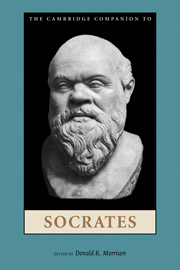Book contents
- Frontmatter
- 1 The Rise and Fall of the Socratic Problem
- 2 The Students of Socrates
- 3 Xenophon and the Enviable Life of Socrates
- 4 Socrates in Aristophanes’ Clouds
- 5 Socrates and the New Learning
- 6 Socratic Religion
- 7 Socrates and Democratic Athens
- 8 Socratic Method
- 9 Self-Examination
- 10 Socratic Ignorance
- 11 Reconsidering Socratic Irony
- 12 Socratic Ethics and the Socratic Psychology of Action
- 13 Socrates and Eudaimonia
- 14 Socrates’ Political Philosophy
- 15 Socrates in Later Greek Philosophy
- Socrates Bibliography
- Index of Names and Subjects
- Index of Passages
13 - Socrates and Eudaimonia
Published online by Cambridge University Press: 28 March 2011
- Frontmatter
- 1 The Rise and Fall of the Socratic Problem
- 2 The Students of Socrates
- 3 Xenophon and the Enviable Life of Socrates
- 4 Socrates in Aristophanes’ Clouds
- 5 Socrates and the New Learning
- 6 Socratic Religion
- 7 Socrates and Democratic Athens
- 8 Socratic Method
- 9 Self-Examination
- 10 Socratic Ignorance
- 11 Reconsidering Socratic Irony
- 12 Socratic Ethics and the Socratic Psychology of Action
- 13 Socrates and Eudaimonia
- 14 Socrates’ Political Philosophy
- 15 Socrates in Later Greek Philosophy
- Socrates Bibliography
- Index of Names and Subjects
- Index of Passages
Summary
introduction
It has long been a commonplace that ancient ethical thought is characterized by its eudaimonism. The great nineteenth-century moral philosopher Henry Sidgwick, for example, remarks that “in the whole ethical controversy of ancient Greece … it was assumed on all sides that a rational individual would make the pursuit of his own good his supreme aim.” Sidgwick also thinks that its commitment to eudaimonism is one of the most important features that distinguishes ancient ethical reflection from that of the moderns from the time of Bishop Butler on. 1 Whether or not we accept Sidgwick’s claims, eudaimonia (typically translated as “happiness”) is a central concept in ancient Greek ethical and political philosophy. In this chapter, I shall examine the idea of eudaimonia or happiness in Socrates’ thought and consider what place it has in his views about how to live and how to act, what content he gives it, and its relation to other important notions, such as virtue and knowledge.
But before turning to these substantive issues, I begin by marking out the territory that I shall be exploring. Many scholarly controversies surround any discussion of Socrates. For example, what evidence do we have for the views of the historical Socrates? How reliable are the depictions of Socrates by Plato, Xenophon, Aristophanes, and other “Socratic” writers? Can we reliably date Plato’s dialogues so as to isolate those that are closest in time to his association with Socrates? Since other essays in this volume consider these disputes in greater detail, I shall simply state the limitations of my discussion without examining the arguments justifying them. My way of carving up this territory, although certainly not the only plausible one, is fairly common.
- Type
- Chapter
- Information
- The Cambridge Companion to Socrates , pp. 293 - 332Publisher: Cambridge University PressPrint publication year: 2010
- 27
- Cited by



